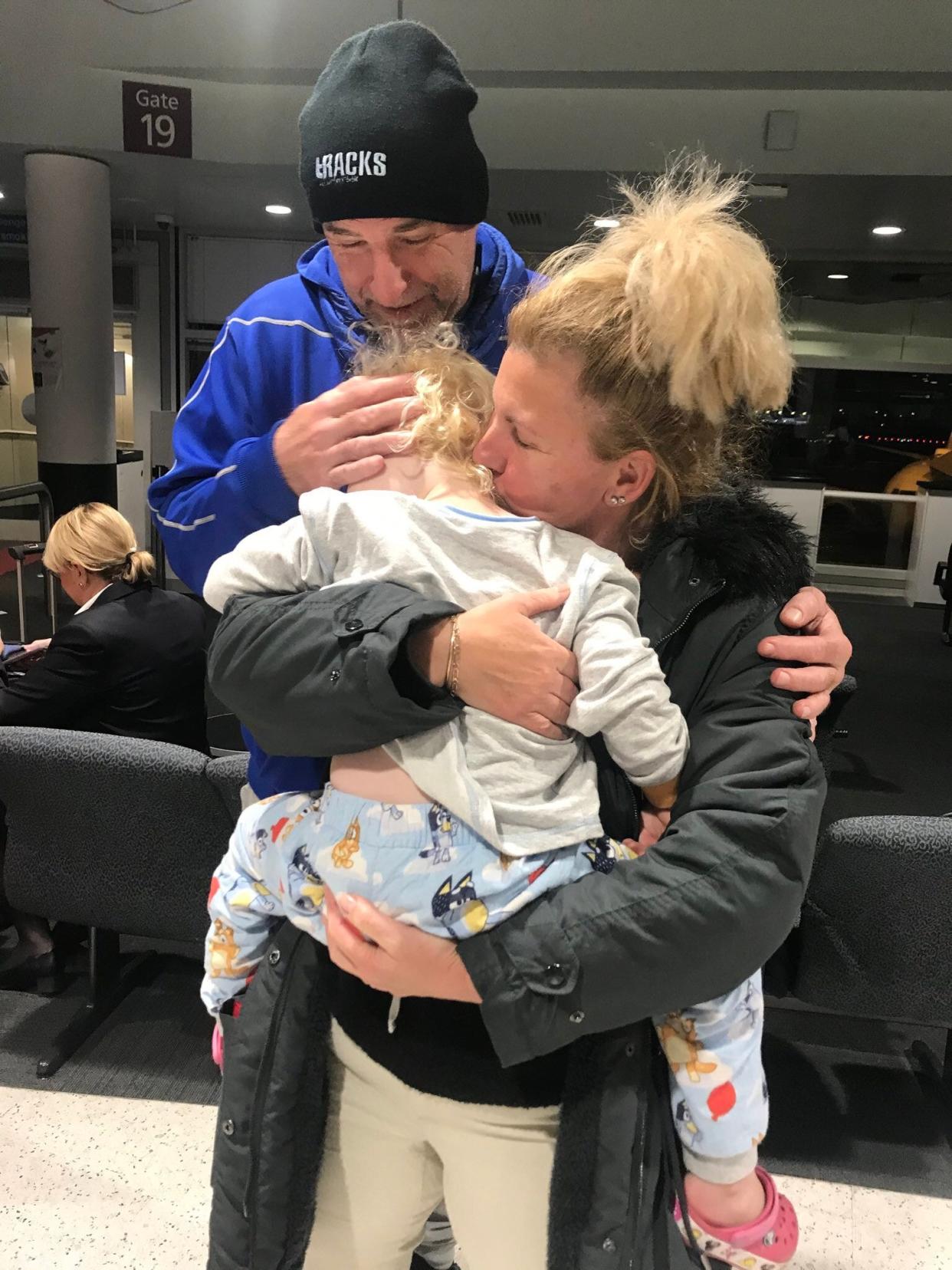'There's only so much you can say on the phone': How COVID-19 travel restrictions have impacted families and couples

In the early hours of July 28, Alexis Olson of Minnesota woke up to a frantic phone call from her boyfriend, Josh Atkinson.
Atkinson – who lives 4,000 miles away in York, England – was delivering news the two had been waiting more than a year to hear: England would ease travel restrictions for American visitors starting Monday.
“We were ecstatic,” he said. “We had waited so long for it. … We’ll be able to do things (together) face-to-face instead of on a screen.”
The two had been separated since February 2020, filling the months with movie dates shared through screens and phone calls that went late into the night for Olson (or for Atkinson, early mornings).
Olson plans to visit Atkinson in England later this month, and he can't wait for the movie moment when they reunite.

While their time apart is coming to an end, other international families and couples are still waiting for a chance to reunite with their loved ones.
The U.S. and other nations first started implementing lockdowns and travel restrictions early last year. While some countries have started to welcome back international travelers, White House officials said last week that the country has no plans to lift travel restrictions given the rise of the delta variant.
In the meantime, families and couples scattered across the globe are waiting for a chance to see their loved ones.
►'Do not travel': CDC, State Department raise UK travel alert after spike in COVID cases
►Travel ban: US intends to keep travel restrictions in place against UK, European countries, others
'It’s just going to be a sigh of relief' after more than 540 days apart
Lori Garrote tries not to keep track, but she knows it’s been more than 540 days since she’s seen her partner in person.
The Miami resident’s partner resides in Milan. The two were used to being in a long-distance relationship and would visit each other multiple times a year, taking weekslong vacations to explore Italy or roam the beaches of Miami together.
But the pandemic made that nearly impossible.
Travel from Italy to the U.S. is still heavily restricted, even though Italy has been welcoming Americans since mid-May.
“Having my partner in a different part of the world was is challenging,” Garrote said. “I’m an introvert … (but) I didn’t realize until now how much I hated being alone.”
Garrote said the travel ban put a strain on their relationship. She wanted to visit Milan as soon as possible (Italy began allowing people with a “stable” relationship with someone in the country to enter in September), but her partner was afraid the trip could put both their lives at risk.
Some of the hardest days were in the spring of 2020 when Italy was regularly reporting more than 500 COVID-19-related deaths per day. Garrote said the din of ambulances could constantly be heard in the background of phone calls with her partner.
“She’s a tough Italian woman. She’s very prideful, so she doesn’t like to admit she’s been suffering," Garrote said. "But she has been suffering."
Garrote would try to cheer her partner up by sending flowers or ordering delivery food to her house, but there’s only so much one can do from 5,000 miles away.
“The fact that I could do absolutely nothing to help her, to help the situation, nothing ... to make her feel better. That was one of the worst feelings ever,” Garotte said.
But things are looking up; Garrote planned to visit Italy in early August.
“I’m quite nervous about it because we don’t know what to expect,” she said. “(But) I’m ecstatic to see her. … There’s only so much you can say on the phone. It’s just going to be a sigh of relief.”
►Travel ban extended: US intends to keep travel restrictions in place against UK, European countries, others
Finding ways around travel bans means thousands of dollars and weeks of travel
In early 2020, Mirella Werthmann and her boyfriend were getting ready to make a trip to the U.S. to visit her father, his wife and Werthmann's half siblings.
The 28-year-old dual citizen had been living in Austria and was excited to introduce her boyfriend to her father and get the chance to meet her young half siblings after five years away from the states.
Then came the travel ban.

In March 2020, the U.S. banned most travel from non-U.S. citizens who have been in Brazil, China, the United Kingdom and much of Europe. President Joe Biden reinstated the ban shortly after taking office in January.
“It’s really hard. I’m finishing up school, and I have to figure out if I want to go back to the U.S. permanently or if I want to stay in Europe, but I would really, really like for my dad to meet my boyfriend,” she said. “That’s not exactly tourism.”
Werthmann is planning to visit the U.S. with her boyfriend through a "bridge country" – traveling to a country not included in the travel ban, waiting 14 days and then flying to the U.S. It’s an arduous way to get around the travel ban and can be risky since some bridge countries have higher COVID-19 rates than the EU.
It’s also expensive. Werthmann estimates the trip will cost an additional $2,000, including COVID-19 tests and two weeks in a Croatian Airbnb.
“This eternal uncertainty (on when travel bans will end) is really heart-wrenching," she said. “(Phone calls can’t compare to) giving your dad a hug or actually seeing someone face-to-face. You’re drifting apart a little bit."
The travel ban 'pushes back a lot of timelines'
Lianne Anderson finally has a plan in place to see her boyfriend, José Lucas Cordeiro of Brazil, but the process won’t be easy.
Since Cordeiro lives in a country included in the U.S. travel ban, he plans to visit Mexico for 14 days before heading toward Anderson in Boston.
Anderson said she worries about his health while traveling since Cordeiro is one of the many people in Brazil still waiting for a chance to get vaccinated. About 20% of the country has been fully vaccinated as of Tuesday, according to Our World in Data, a project from the University of Oxford.

“Given the way the (travel) restriction is written, where people just end up going to third countries anyway, it puts a lot of people at risk,” Anderson said. “We just have to hope and pray that no flights get canceled, no one tests positive, he doesn’t get sick and he can access the COVID tests (needed to cross borders) when he needs to.”
Anderson had felt optimistic that the U.S. would welcome back travelers this year, but that hope dwindled with the rise of the delta variant. The highly contagious strain has pushed some countries to extend or reinstate travel restrictions, including the U.S.
“(The travel ban) pushes back a lot of timelines,” Anderson said. “We were thinking about marriage, we were thinking about trips and things like that, and so many things get put on the back burner. … It kind of feels like you’re stuck in the place you’ve been at since the pandemic began.”

A two-hour drive across a closed border is 'so close, and yet so far'
Charlotte Vaughan's home in Canada is just a two-hour drive from her daughter, Denise Mauer, but the gap has felt much wider this past year.
Mauer and her husband recently moved to Niagara Falls, New York, to be closer to her parents. Vaughan said she would have offered to help them move, but travel restrictions meant she could only offer support via FaceTime.
The two haven’t seen each other in person since December 2019.

“We used to always visit once or twice a year,” the 66-year-old Ontario resident said. "(Now) they’re so close, and yet so far.”
The Canadian side of the border is set to open to vaccinated Americans on Aug. 9, but Mauer will be recovering from surgery at that time. Vaughan is anxiously waiting for the U.S. to ease travel restrictions on its sideof the borderso she can visit her daughter's new home, but U.S. borders with Mexico and Canada are set to remain closed through at least Aug. 21.
Vaughan said the restrictions have been frustrating. While flying to the U.S. is possible, the U.S. government won’t let her cross the border by car – a less expensive travel method.
“I got my shot, I wear my mask, (my daughter and son-in-law) went and got their shots and wear their masks, they moved closer, and we still can’t (see them),” Vaughan said. “I just don’t understand the rules.”
US-Canada border: Canada to reopen its borders to fully vaccinated Americans starting Aug. 9
US borders: US extends Mexico, Canada border restrictions through Aug. 21
Even as restrictions ease, travel costs skyrocket. 'I'm sad. Just broken.'
Indiana-based Christin Bell was used to seeing her long-distance boyfriend, Josh Hague of England, every six weeks or so.
At this point, it’s been seven months.

The time apart has been hard for Bell, who said she lost weight and was diagnosed with a panic disorder after the onset of the pandemic. Not being able to see Hague in person made those struggles more difficult to deal with, she said.
“I’m 4,000 miles away from the one person in life who is my support system,” she said.
Bell was able to visit Hague in December by working remotely through the required quarantine period, but she said her office is less flexible with remote work these days.
While the U.K. recently announced plans to waive its quarantine requirement for vaccinated American visitors, Bell believes the mandated testing requirements that remain in place in England are too expensive. She estimated they would cost her more than $300 on top of the airfare costs.

“Americans can go to the EU … (but) I can’t afford the insane COVID prices for testing in the U.K., and he can’t get here, even though he’s a freelancer and has a lot more time available to him,” Bell said. “I’m sad. Just broken.”
UK Travel: England, Scotland and Northern Ireland relax travel restrictions for vaccinated Americans
'It's been hard': Grandparents haven't gotten to meet new granddaughter

Priscilla Wells’ daughter, Dulcie, has yet to meet her grandparents. Wells isn't sure when the 2-month-old will get the chance.
Wells moved to Sioux Falls, South Dakota, with her 4-year-old daughter Poppy in July 2020 to be with her husband. She hasn’t seen her parents since.
The separation has been especially hard for Poppy since she used to live with her grandparents and Wells in Australia. The family tries to stay connected through video chats, but the 15-hour time difference makes it difficult.
Australia’s borders are closed to most travelers, and its national cabinet tightened international travel restrictions earlier this month to curb the spread of the delta variant. Based on the country’s current reopening plan, Wells’ parents likely won’t be able to meet Dulcie until she’s over a year old.

“It’s been hard,” Wells said. “We’ve been here for a year … and we still haven’t seen them. (Poppy) still talks about when she’s going to visit them and what toys she’s going to pack.”
Follow USA TODAY reporter Bailey Schulz on Twitter: @bailey_schulz.
This article originally appeared on USA TODAY: Travel restrictions: Families, couples waiting to reunite amid COVID